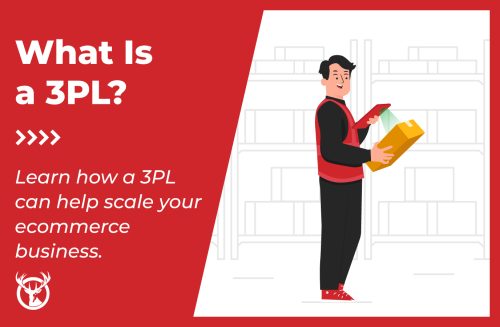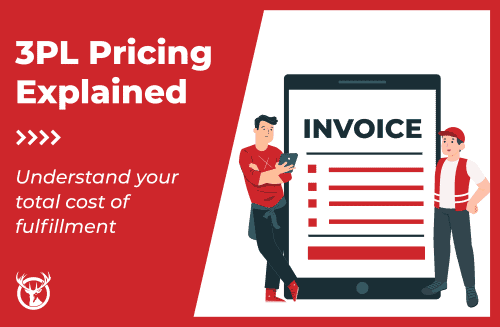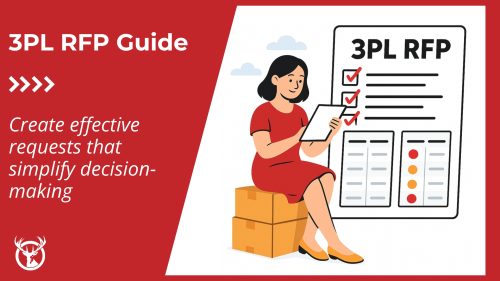What is B2B order fulfillment?
B2B order fulfillment is when a third-party logistics provider (3PL) ships orders to a business on behalf of another business.
3PLs can serve as strategic partners that support your B2B fulfillment and supply chain logistics by receiving and storing items, packaging or palletizing items for transport, and helping manage shipping carrier partners.

Need a trustworthy B2B fulfillment partner? Red Stag offers B2B fulfillment services for brands who ship both B2B and DTC.
We have deep experience with LTL shipping for your freight needs, and can ship to a wide range of retailers and platforms, including Amazon, Walmart, Target, and many more. We even offer a freight management service to handle the complexities of inbound and outbound freight for you.
Want to see if we’re a good fit? Reach out today.
B2B order fulfillment services
Your B2B 3PL may help in various ways, depending on the nature of your business, including:
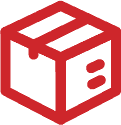
Acting as a distributor, moving freight or bulk orders of products along your supply chain to other fulfillment centers, factories, or customer addresses.

Serving as a wholesale fulfillment partner, moving items to your customers or to you from wholesalers.

Offering value-added services to help streamline and grow your business as part of an extended partnership.
In some cases, your company may need a mix of these B2B fulfillment services, especially as your supply chain grows.
B2B wholesale fulfillment
In addition to distribution, B2B wholesale fulfillment may serve various other supply chain structures:

Receiving products from suppliers

Selling products to retailers

Selling or receiving parts for assembly of products

Selling or receiving supplies or other products for internal use
For each of these supply chain types, fulfillment activities vary. Let’s take a look at some of the specialized B2B fulfillment services you may need.
Consolidation
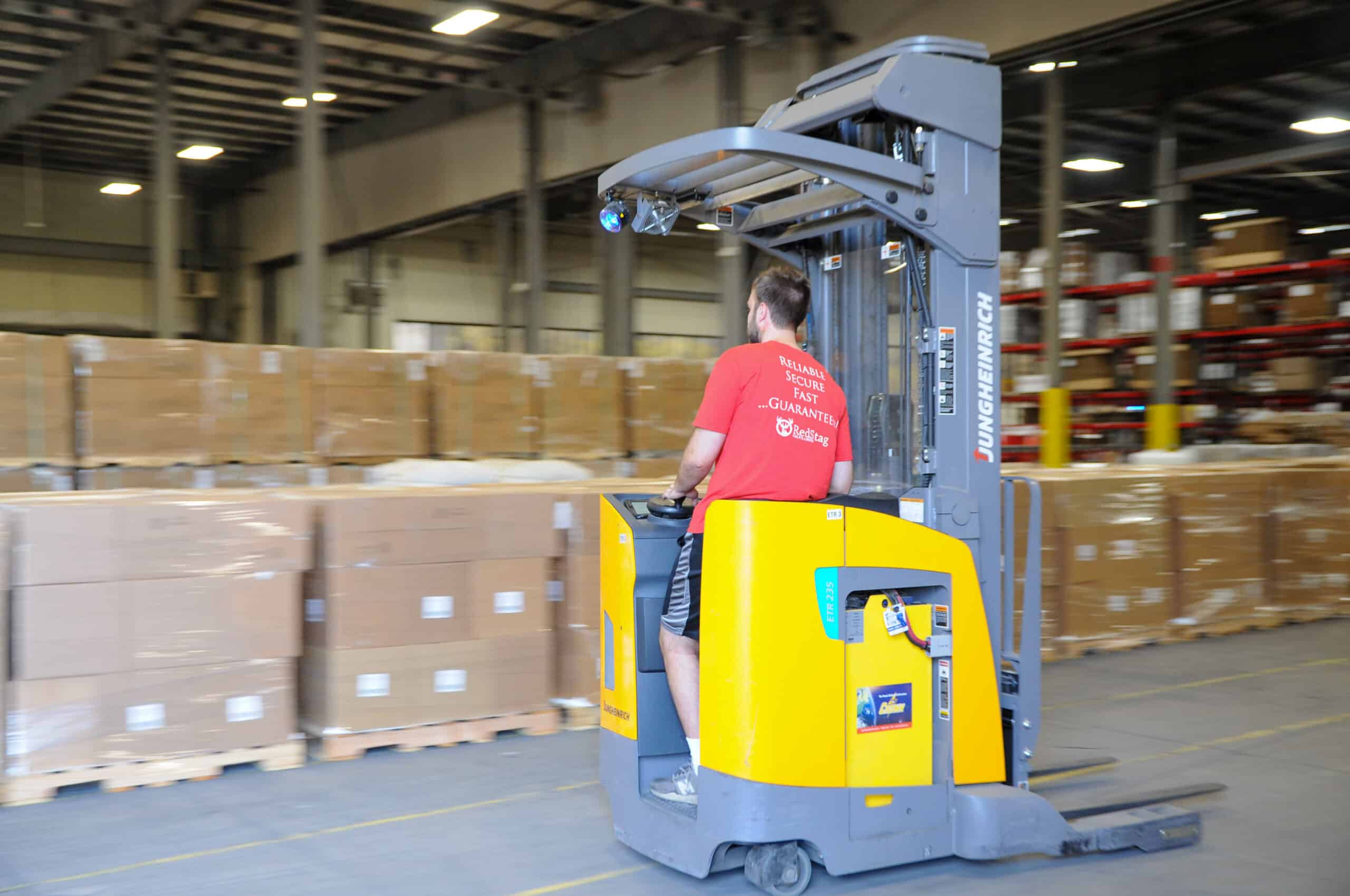
Freight consolidation, sometimes called “consol,” is a logistics strategy that combines multiple smaller shipments from different shippers into a single, larger shipment.
The shipment is transported as a single unit to its destination, reducing costs and improving efficiency when shipping wholesale orders. This provides economic scalability for 3PL customers, who can combine multiple less-than-truckload (LTL) shipments to capture the lower full-truckload (FTL) prices.
The key to these cost efficiencies is container utilization rates. When truck containers are fully used—like they are with FTL shipping—carriers are able to earn more by sidestepping the losses of wasted space.
From their perspective, consolidated freight also helps optimize capacity across larger transportation networks, letting them move higher volumes at scale. These benefits circle back to your company by helping to stabilize demand and pricing on truck space.
With help from an experienced B2B fulfillment 3PL, strategic consolidation may contribute to faster, more resilient supply chains.
Some companies rely on B2B shipping for smaller orders, too. In some cases, order volumes that can’t be palletized may not qualify for freight consolidation. You may still work with a 3PL fulfillment center, but some items will need to ship in parcels with last-mile delivery carriers.
Just-in-time services
If your company relies on just-in-time (JIT) fulfillment, a 3PL may be a necessary partner to help meet the exacting demands of lean supply chains.
JIT fulfillment aims to deliver goods precisely when needed, minimizing inventory-carrying costs by keeping parts or products upstream for as long as possible.
The quick turnarounds of these fulfillment processes can be challenging to achieve in-house, but partnering with a 3PL that specializes in building logistics efficiency for warehousing solutions, inventory management, and transportation services can free you up to focus on the other priorities that will help your business grow.
Batch or lot identifier recordkeeping
If you sell food and beverage or healthcare products, you may have recordkeeping compliance requirements. For many products in these categories, records must be kept end-to-end across supply chains.
This can make some B2B recordkeeping highly complex, because products may transform across the supply chain. For example, non-medical components might join together to form medical devices, and separate ingredients may become food products. Recordkeeping identifiers might need to be updated at these or other stages along the way.
Your 3PL fulfillment service can help you maintain compliance with recordkeeping requirements by providing access to real-time statuses on warehousing and logistics. With dedicated staff to perform quality control checks at different points of fulfillment, they can take the labor-intensive taskwork off your hands.
B2B fulfillment and supply chain resilience
There are several ways a B2B 3PL fulfillment service can help you build supply chain resilience. The right partnership may help your business survive challenges and thrive in times of opportunity.
Align supply chains with demand
A good B2B fulfillment partner helps align inventory with accurate, on-time deliveries that help you minimize stockouts and excess inventory. They can also help prevent supply chain disruptions by supporting efficient manufacturing and assembly.
When inventory and demand are out of sync, you risk what’s known as “the bullwhip effect.” This is when signals are off, so decisions are formed with inaccurate data. When scaled across the supply chain, the impact of these decisions compounds.
For example, say you’re a mid-sized wholesaler. You have a million things on your plate and forgot to confirm a carrier booking. Your retail business customer didn’t receive your products in time and suffered a stockout.
In response, you increase quantities on your next factory order, even if it increases your carrying costs because you can’t breach retailer agreements to maintain continuous stock without consequences.
But big box retailers don’t want to take risks. Your retail store customer reduces their order commitment, forcing you to slash your unit prices or take on other expenses to unload the products. You also lose the projected profit from the higher retailer orders.
At each step of the supply chain, your revenue decreases and costs increase because you don’t have the resources to straighten out mixed signals. A fulfillment service can supplement your resources to avoid these scenarios.
Scale wholesale businesses
With a mix of experience and technology, your 3PL’s B2B fulfillment may fuel wholesale business growth by streamlining large order handling and supporting diverse product lines.
This lets you introduce new products in response to evolving market trends, knowing your 3PL’s infrastructure can adapt to accommodate the increased storage demands or additional packaging needs.
Your 3PL may also be able to support geographic scalability. If you’re expanding nationally or increasing market share in certain regions, a fulfillment partner can leverage its resources to help you grow. You can benefit almost immediately from their strategically located fulfillment centers and relationships with shipping carriers.
What is B2C order fulfillment?
The B2C order fulfillment process focuses on the efficient management of picking and packing services and coordination of shipping individual orders directly to retail shoppers. It’s sometimes known as ecommerce fulfillment, and the B2C acronym stands for business-to-consumer (or customer).
In contrast to B2B fulfillment, which typically deals with bulk shipments to businesses, B2C fulfillment serves retail stores and their customers. Like a B2B order fulfillment company, B2C fulfillment may also include value-added services, like kitting, assembly, and demand planning.
Kitting and assembly
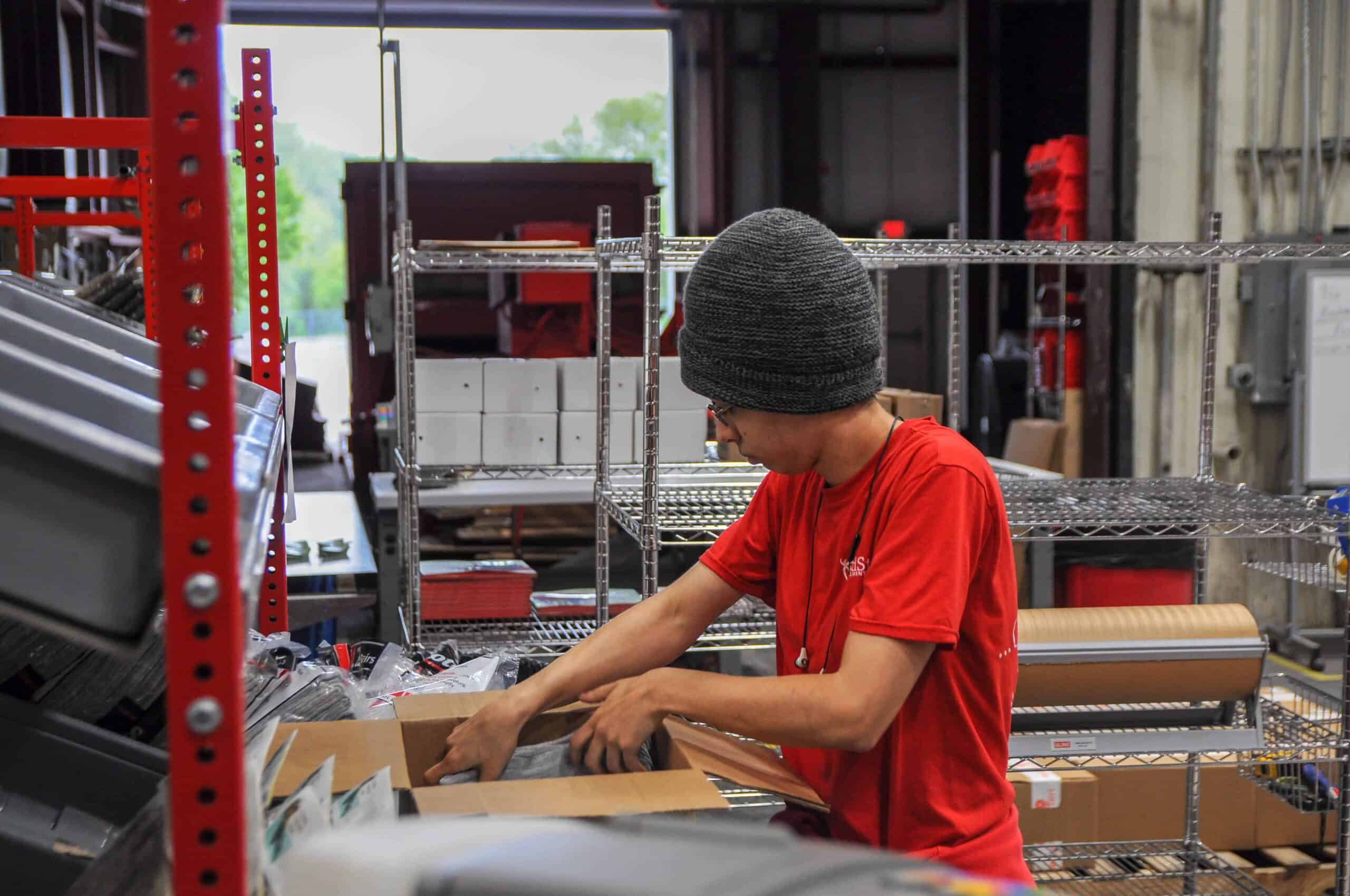
Kitting in B2C order fulfillment involves bundling multiple products into a single package before shipping. This helps improve customer experience by presenting related items together, offering convenience, and potentially boosting additional sales.
Some retailers may require kitting as part of a subscription box service. Others may require it as part of a promotional bundle.
Assembly is when a 3PL helps put together individual components to create a final product before shipping. This lets retailers sell customized products based on customer preferences, but it can also help streamline supply chains when some products are large, heavy, or bulky.
Demand planning
By looking at your business data, you might be able to optimize inventory levels, reduce stockouts, and speed up order fulfillment. This proactive approach can help businesses maintain customer satisfaction and loyalty by making sure inventory aligns with demand.

PRO TIP: Your 3PL may be able to help with demand planning. Not only do they have your data, but they also have the ability to anonymize data across their operations. This lets them share deeper insights based on larger datasets than you could achieve on your own.
B2B vs. B2C fulfillment
B2B and B2C fulfillment models are distinct and designed for businesses with different objectives. However, there may be some overlap if you decide to expand your business into wholesaling.
When getting started, it can help to explore the differences between B2B and B2C order fulfillment models.
Order fulfillment types
One of the fundamental distinctions between B2B and B2C fulfillment is the order type.

Business-to-business transactions involve bulk quantities, and businesses are the primary customers.

B2C handles smaller orders sent directly to retail customers, often handled by a 3PL on behalf of the retailer.
Some people shop B2C channels for their small businesses, but once those businesses grow, they tend to switch to larger orders.
Additionally, B2C order fulfillment centers typically follow a pick, pack, and ship model, efficiently managing smaller orders to protect online retailer profit margins.
B2B fulfillment can be more complex, adhering to retailer routing guides that specify requirements for distributing into their receiving networks.
B2C shipment sizes also tend to be smaller. Orders that would be considered large, heavy, or bulky in B2C order fulfillment may be small compared to the palletized or consolidated B2B orders.
Delivery
B2C shipments go to customer addresses as quickly as possible, emphasizing convenience as part of customer satisfaction.
B2B shipments, on the other hand, may go through several logistics nodes before reaching their endpoint.
When to outsource to a B2B 3PL
You may reach certain points in your company’s journey where new order fulfillment partnerships make sense. Here are some of the signals that might indicate the time is right.
In-house fulfillment challenges
It’s common for growing businesses to grapple with insufficient storage space, struggling to meet stringent delivery deadlines. As you continue to rush, you may have to contend with increasing errors and inefficiencies in the fulfillment process.
Try to address these challenges early if you can, because carrier partnerships can be hard to optimize when you’re busy doing other things.
Expansion into wholesaling
The decision to pursue wholesale accounts is a massive shift. It means you can capture a broader market, but also have two unique supply chains to manage. One handles bulk orders to retail distribution centers or brick-and-mortar stores. The other handles deliveries to each customer’s address.
When launching new business units, a strategic partner can help you create the required processes and get started with your new venture.
Meeting retailer requirements
Retailer requirements can be tough to meet for growing businesses. Compliance with specific labeling and other regulatory matters is vital.
If you breach your agreements, you may lose partnerships. And if you took on debt to capitalize growth into these partnerships, losing them could undermine your entire business.
A 3PL can help you follow routing guides, scaling your fulfillment operations while meeting stringent requirements. Their support may improve your chances of a successful partnership.
Streamline B2B fulfillment
Red Stag Fulfillment provides B2C and B2B fulfillment expertise to help optimize your fulfillment operations.
We offer specialized shipping services for your ecommerce company and your wholesale, major retailer, and marketplace partners. Extended services include kitting, assembly, custom packaging, and demand planning.
Services are backed by our 100% accuracy and 0% shrinkage guarantees. If we make a mistake, we’ll fix it right away and pay you an additional fee for the inconvenience.






